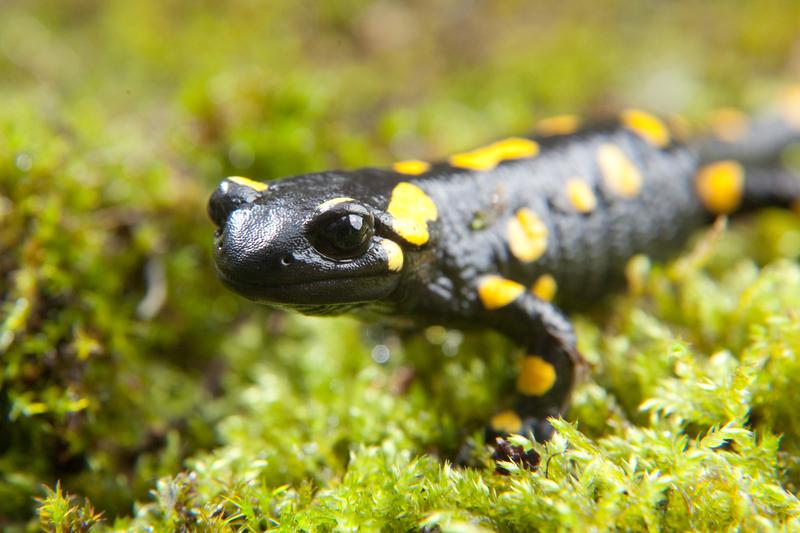

Unlike mammals, cold-blooded amphibians remember memories they made before their hibernation.
Johannes Hloch
Researchers from the Messerli Research Institute of Vetmeduni Vienna and University Vienna and University of Lincoln discovered that brumation – the period of winter dormancy that is observed in cold-blooded animals, similar to the process of hibernation in mammals – does not seem to adversely affect the memory of salamanders.
This key finding differs dramatically from previous studies of mammals, which show that hibernation often causes animals to forget some of the memories they formed prior to their period of inactivity.
Effect of hibernation on cognition unknown for coldblooded
Ludwig Huber, head of the Unit of Comparative Cognition of the Messerli Research Institute of Vetmeduni Vienna and the University of Vienna and Anna Wilkinson, University of Lincoln, explained: “Long-term torpor is an adaptive strategy that allows animals to survive harsh winter conditions. However, the impact that this has on cognitive function is poorly understood. We know that in mammals, hibernation causes reduced synaptic activity and can cause them to lose some of the memories they formed prior to hibernation, but the effect of brumation on memory has been unexplored, until now.
Salamanders remember after torpor, mammals do not after hibernation
The researchers trained twelve salamanders to navigate a T-maze and remember the path they needed to take to reach a reward. Half of the animals were then placed into brumation, while the other half continued under normal keeping conditions. A post-brumation memory retention test revealed that animals from both conditions recalled how to navigate the maze.
“We demonstrated that each of the animals solved the task using memory, rather than sensory cues such as smell of the reward,” Huber said, The scientists therefore confident that the period of brumation did not impact on their ability to remember. “For these animals, memory retention is essential for survival as it allows them to recall important information about the environment, such as the location of food and the presence of predators”, explains Wilkinson.
Type of dormancy obviously directs cognition
The researchers suggest that the differences in retention observed between mammals and amphibians could be caused by their different learning and memory processes, or the nature of their torpor. Mammals regularly rouse from their hibernation and enter intervals of sleep, whereas cold-blooded animals are dependent on the temperature of their surroundings during brumation and are therefore forced to stay torpid until temperatures rise.
Service:
The article “ The effect of brumation on memory retention” by Anna Wilkinson, Anne Hloch, Julia Mueller-Paul and Ludwig Huber was published in Scientific Reports.
About Messerli Research Institute
The Messerli Research Institute was founded in 2010 with support from the Messerli Foundation (Sörenberg, Switzerland) under the management of the University of Veterinary Medicine, Vienna in cooperation with the Medical University of Vienna and the University of Vienna. The research is devoted to the interaction between humans and animals, as well as its theoretical principles in animal cognition and behavior, comparative medicine and ethics. Its work is characterized by its broad interdisciplinary approach (biology, human medicine, veterinary medicine, philosophy, psychology, law) and strong international focus. http://www.vetmeduni.ac.at/en/messerli/
About the University of Veterinary Medicine, Vienna
The University of Veterinary Medicine, Vienna in Austria is one of the leading academic and research institutions in the field of Veterinary Sciences in Europe. About 1,300 employees and 2,300 students work on the campus in the north of Vienna which also houses five university clinics and various research sites. Outside of Vienna the university operates Teaching and Research Farms. http://www.vetmeduni.ac.at
Scientific Contact:
Ludwig Huber
Messerli Research Institute
University of Veterinary Medicine Vienna (Vetmeduni Vienna)
T +43 1 25077 2680
ludwig.huber@vetmeduni.ac.at
Released by:
Georg Mair
Science Communication / Corporate Communications
University of Veterinary Medicine Vienna (Vetmeduni Vienna)
T +43 1 25077-1165
georg.mair@vetmeduni.ac.at
http://www.vetmeduni.ac.at/en/infoservice/presseinformation/presseinformationen-…












